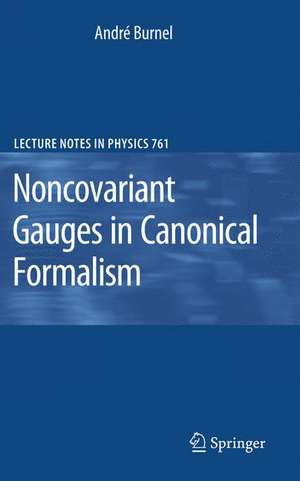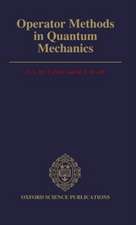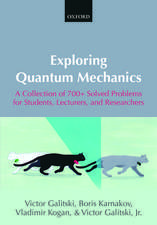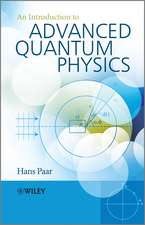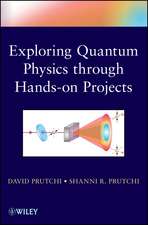Noncovariant Gauges in Canonical Formalism: Lecture Notes in Physics, cartea 761
Autor André Burnelen Limba Engleză Hardback – 6 oct 2008
The present work presents, in a rigorous way, a consistent formulation for the handling of noncovariant gauges in the quantization and renormalization of gauge theories. Though the path integral method is very convenient for the proof of unitarity and renormalizability of gauge theories, the canonical formalism is eventually necessary to to expose the issues in a self-consistent way.
These notes are written as an introduction to postgraduate students, lecturers and researchers in the field and assume prior knowledge of quantum field theory.
| Toate formatele și edițiile | Preț | Express |
|---|---|---|
| Paperback (1) | 385.62 lei 6-8 săpt. | |
| Springer Berlin, Heidelberg – 22 oct 2010 | 385.62 lei 6-8 săpt. | |
| Hardback (1) | 391.61 lei 6-8 săpt. | |
| Springer Berlin, Heidelberg – 6 oct 2008 | 391.61 lei 6-8 săpt. |
Din seria Lecture Notes in Physics
- 19%
 Preț: 423.99 lei
Preț: 423.99 lei - 17%
 Preț: 360.73 lei
Preț: 360.73 lei -
 Preț: 429.22 lei
Preț: 429.22 lei - 17%
 Preț: 427.62 lei
Preț: 427.62 lei - 17%
 Preț: 460.25 lei
Preț: 460.25 lei -
 Preț: 427.96 lei
Preț: 427.96 lei -
 Preț: 481.93 lei
Preț: 481.93 lei - 17%
 Preț: 494.64 lei
Preț: 494.64 lei -
 Preț: 281.90 lei
Preț: 281.90 lei - 17%
 Preț: 493.20 lei
Preț: 493.20 lei - 17%
 Preț: 426.72 lei
Preț: 426.72 lei -
 Preț: 365.15 lei
Preț: 365.15 lei -
 Preț: 374.52 lei
Preț: 374.52 lei -
 Preț: 407.98 lei
Preț: 407.98 lei - 20%
 Preț: 428.12 lei
Preț: 428.12 lei - 15%
 Preț: 593.73 lei
Preț: 593.73 lei - 15%
 Preț: 528.13 lei
Preț: 528.13 lei -
 Preț: 493.12 lei
Preț: 493.12 lei - 17%
 Preț: 425.68 lei
Preț: 425.68 lei -
 Preț: 280.65 lei
Preț: 280.65 lei -
 Preț: 163.41 lei
Preț: 163.41 lei - 18%
 Preț: 726.59 lei
Preț: 726.59 lei -
 Preț: 394.84 lei
Preț: 394.84 lei - 15%
 Preț: 709.63 lei
Preț: 709.63 lei - 15%
 Preț: 623.90 lei
Preț: 623.90 lei - 20%
 Preț: 476.91 lei
Preț: 476.91 lei - 15%
 Preț: 428.05 lei
Preț: 428.05 lei -
 Preț: 342.78 lei
Preț: 342.78 lei - 18%
 Preț: 851.93 lei
Preț: 851.93 lei -
 Preț: 346.61 lei
Preț: 346.61 lei -
 Preț: 391.57 lei
Preț: 391.57 lei - 15%
 Preț: 633.16 lei
Preț: 633.16 lei -
 Preț: 451.71 lei
Preț: 451.71 lei - 5%
 Preț: 1497.80 lei
Preț: 1497.80 lei -
 Preț: 374.85 lei
Preț: 374.85 lei -
 Preț: 380.07 lei
Preț: 380.07 lei - 15%
 Preț: 516.14 lei
Preț: 516.14 lei - 15%
 Preț: 583.78 lei
Preț: 583.78 lei - 15%
 Preț: 510.95 lei
Preț: 510.95 lei -
 Preț: 469.71 lei
Preț: 469.71 lei -
 Preț: 388.90 lei
Preț: 388.90 lei - 15%
 Preț: 500.24 lei
Preț: 500.24 lei -
 Preț: 386.52 lei
Preț: 386.52 lei - 15%
 Preț: 472.88 lei
Preț: 472.88 lei -
 Preț: 424.27 lei
Preț: 424.27 lei -
 Preț: 380.07 lei
Preț: 380.07 lei - 15%
 Preț: 500.01 lei
Preț: 500.01 lei - 15%
 Preț: 501.96 lei
Preț: 501.96 lei
Preț: 391.61 lei
Nou
Puncte Express: 587
Preț estimativ în valută:
74.94€ • 77.77$ • 62.64£
74.94€ • 77.77$ • 62.64£
Carte tipărită la comandă
Livrare economică 17-31 martie
Preluare comenzi: 021 569.72.76
Specificații
ISBN-13: 9783540699200
ISBN-10: 3540699201
Pagini: 256
Ilustrații: XV, 236 p. 21 illus.
Dimensiuni: 155 x 235 x 20 mm
Greutate: 0.5 kg
Ediția:2009
Editura: Springer Berlin, Heidelberg
Colecția Springer
Seria Lecture Notes in Physics
Locul publicării:Berlin, Heidelberg, Germany
ISBN-10: 3540699201
Pagini: 256
Ilustrații: XV, 236 p. 21 illus.
Dimensiuni: 155 x 235 x 20 mm
Greutate: 0.5 kg
Ediția:2009
Editura: Springer Berlin, Heidelberg
Colecția Springer
Seria Lecture Notes in Physics
Locul publicării:Berlin, Heidelberg, Germany
Public țintă
ResearchCuprins
Canonical Quantization for Constrained Systems.- Quantization of the Free Electromagnetic Field in General Class III Linear Gauges.- Quantization of the Free Electromagnetic Field in Class II Axial Gauges.- Gauge Fields in Interaction.- Perturbation Theory: Renormalization and All That.- Slavnov-Taylor Identities for Yang-Mills Theory.- Field Theory Without Infinities.- Gauges with a Singular C Matrix.- Conclusion.
Recenzii
From the reviews:
"This book develops a consistent formulation for the handling of noncovariant gauges in the quantization process. … provide the setting of the noncovariant gauge theories on the same levels of consistency as the covariant ones, by means of the canonical formalism. … the author has also included a detailed and complete description of the quantization theory of constrained systems. … All in all, this comprehensive … monograph represents a gratifying addition for graduate students and researchers from high energy physics, gauge theories and related areas." (Vladimir Balan, Zentralblatt MATH, Vol. 1159, 2009)
“In this book the quantization of abelian and non-abelian gauge theories in non-covariant gauges in the canonical formalism is treated in detail. … great value to anyone involved with the quantization of gauge theories, or even with gauge-fixed gauge theories in general, and provides essential knowledge. … the book can also be highly recommended to advanced students for an extra insight into the complexities of gauge theories. … this book is a definite must-read.” (Axel Maas, Mathematical Reviews, Issue 2010 a)
"This book develops a consistent formulation for the handling of noncovariant gauges in the quantization process. … provide the setting of the noncovariant gauge theories on the same levels of consistency as the covariant ones, by means of the canonical formalism. … the author has also included a detailed and complete description of the quantization theory of constrained systems. … All in all, this comprehensive … monograph represents a gratifying addition for graduate students and researchers from high energy physics, gauge theories and related areas." (Vladimir Balan, Zentralblatt MATH, Vol. 1159, 2009)
“In this book the quantization of abelian and non-abelian gauge theories in non-covariant gauges in the canonical formalism is treated in detail. … great value to anyone involved with the quantization of gauge theories, or even with gauge-fixed gauge theories in general, and provides essential knowledge. … the book can also be highly recommended to advanced students for an extra insight into the complexities of gauge theories. … this book is a definite must-read.” (Axel Maas, Mathematical Reviews, Issue 2010 a)
Textul de pe ultima copertă
By definition, gauge theories - among the cornerstones of fundamental theoretical physics - involve more degrees of freedom than required by the underlying physics. The unphysical degrees of freedom must be shown not to yield unwarranted effects at every step in the formalism where explicit Lorentz covariance is required.
The present work presents, in a rigorous way, a consistent formulation for the handling of noncovariant gauges in the quantization and renormalization of gauge theories. Though the path integral method is very convenient for the proof of unitarity and renormalizability of gauge theories, the canonical formalism is eventually necessary to expose the issues in a self-consistent way.
These notes are written as an introduction to postgraduate students, lecturers and researchers in the field and assume prior knowledge of quantum field theory.
The present work presents, in a rigorous way, a consistent formulation for the handling of noncovariant gauges in the quantization and renormalization of gauge theories. Though the path integral method is very convenient for the proof of unitarity and renormalizability of gauge theories, the canonical formalism is eventually necessary to expose the issues in a self-consistent way.
These notes are written as an introduction to postgraduate students, lecturers and researchers in the field and assume prior knowledge of quantum field theory.
